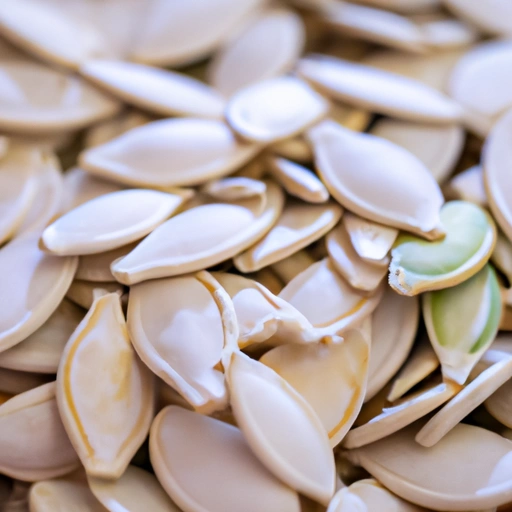Pumpkin Seed
Description

Pumpkin seeds, also known as pepitas, are the edible seeds of a pumpkin or certain other cultivars of squash. They are a popular ingredient in various cuisines and are known for their crunchy texture and nutty flavor. These seeds can be consumed raw or roasted, and are often seen in both sweet and savory dishes. They are packed with nutrients and can be a healthy addition to any diet.
Common uses
Pumpkin seeds are a versatile ingredient used to add texture and flavor to a variety of dishes. They are commonly used as a topping for bread and muffins, incorporated into salads and granolas, or eaten on their own as a snack. Roasted pumpkin seeds can also be blended into spreads like pesto or mixed into veggie burgers for an extra crunch.
Nutritional value
Calories
One ounce (28 grams or approximately 2 tablespoons) of shelled pumpkin seeds contains roughly 151 calories.
Protein
Pumpkin seeds are an excellent source of plant-based protein, with one ounce providing about 7 grams of protein.
Fat
They are rich in healthy fats, including omega-6 fatty acids, with one ounce containing about 13 grams of total fat.
Carbohydrates
Carbohydrate content is relatively low, with one ounce of pumpkin seeds containing about 5 grams of carbs.
Vitamins
Pumpkin seeds are a good source of Vitamin E, Vitamin K, and some B vitamins such as riboflavin, niacin, and folate.
Minerals
These seeds are particularly high in minerals such as magnesium, phosphorus, manganese, iron, zinc, copper, and potassium.
Health benefits
Pumpkin seeds are known for their health-promoting properties. They have been associated with improved heart health, prostate health, protection against certain cancers, and relief from symptoms of menopause. The magnesium in pumpkin seeds may help regulate blood pressure and prevent migraines, while their high fiber content can aid in digestive health.
Potential risks
While pumpkin seeds are generally safe for consumption, they may pose a risk for individuals with allergies to seeds. Overconsumption can lead to gastrointestinal discomfort due to their high fiber and fat content. Also, because they are calorie-dense, eating them in large quantities may contribute to weight gain.
Common recipes
Pumpkin seeds are featured in a range of recipes from Mexican moles to European breads. They can be sprinkled over soups and salads, used in homemade trail mix, or added to oatmeal and yogurt.
Cooking methods
They can be roasted, toasted, or ground. Roasting pumpkin seeds at a low temperature can help preserve their healthy oils.
Pairing with other ingredients
Pumpkin seeds pair well with flavors such as honey, maple syrup, cinnamon, and chili. They also complement other nuts and seeds in various recipes.
Summary
Pumpkin seeds are a highly nutritious and flavorful food ingredient with a rich history and a wide range of culinary applications. Whether used in baking, cooking, or as a snack, pumpkin seeds offer both health benefits and taste satisfaction. Incorporating pumpkin seeds into your diet can be an easy and delicious way to enhance your nutrient intake.